Feds indict LGBTQ org lawyer over testimony in Alabama "judge-shopping" investigation
In an indictment unsealed Monday, Lambda Legal counsel Carl Charles faces a felony charge of making a false declaration to the investigating judicial panel.
Note: This report is the latest development in the Alabama “judge-shopping” investigation, which Law Dork began reporting on in May 2024, including two in-depth reports that provide substantial background on the happenings since 2022.
Federal prosecutors unsealed a felony indictment on Monday alleging that a civil rights lawyer made a false declaration to a panel of federal judges in Alabama who were looking into allegations of “judge-shopping” by LGBTQ legal organizations and allied lawyers challenging the state’s ban on gender-affirming medical care for transgender minors.
The indictment of Carl Charles, counsel in the Southern Regional Office of Lambda Legal, is not directly about the “judge-shopping” allegations raised by U.S. District Judge Liles Burke, a Trump appointee, in April 2022. Instead, it is about a call that Charles told the panel he initially forgot about when he was testifying under oath in the unusual proceedings called for by the judges of the three federal court districts in Alabama in response to Burke’s allegations.
Charles pleaded not guilty to the charge, unsealed in the Middle District of Alabama, on Monday before Magistrate Judge Jerusha Adams.
The indictment comes in the midst of a nationwide attack on trans people’s lives and President Donald Trump’s attacks on lawyers and law firms. Not only is Charles a lawyer who does extensive work in trans-related cases, he also is transgender himself.
Neither Charles nor his lawyers at Melton Espy & Williams PC responded on Monday night to requests for comment, and Lambda Legal provided no comment about the indictment on Monday. Law Dork will provide comment in an update if later provided.
[Update, 10:30 a.m.: In a statement issued Tuesday morning, Lambda Legal strongly defended Carl Charles and the organization’s actions:
“This unjustified federal indictment is an outrageous act of governmental overreach. Lambda Legal rejects the notion that the U.S. government can punish lawyers and law firms for exercising their First Amendment rights by speaking up on behalf of causes to which government officials object.
“For more than three years, our colleague, Carl Charles, has been subjected to unprecedented and abusive judicial proceedings, smearing his character and undermining his role in fighting for some of the most vulnerable people in society. We fundamentally disagree with the characterization of the events that underpin this indictment, which ignores the fact that the routine phone call at issue was acknowledged by the court to be entirely legal and proper.
“We unequivocally stand behind Carl and all of our attorneys, who adhere to the highest ethical and professional standards every day in pursuit of our mission to advance and defend the rights of LGBTQ+ people.”
Law Dork will have more on this story as circumstances warrant.]
The indictment
The indictment described how, in the panel’s inquiry over the handling of two (and ultimately three) cases challenging the ban, Charles was asked about whether he called any judge’s chambers “about the assignment of the case” challenging the ban with which he was involved. Charles said he had not done so. Later, the focus of the questions changed and he was asked whether he called “about the potential for a TRO“ — a temporary restraining order — to be filed in the challenge. He appeared to be confused initially, but ultimately said no.
On the face of the indictment, dated August 19, it then alleged that:
The indictment alleged that these actions are “in violation of Title 18, United States Code, Section 1623“ because Charles “knowingly did make a false material declaration.” Specifically, to claim that his misstatement was “material,” the prosecutors looked more broadly than just the judge-shopping claims:
At the time and place aforesaid, the Court was engaged in an "inquir[y] about the issues raised by counsel's actions" referring to possible circumvention of random case assignment in the district courts. It was a matter material to said hearing to determine whether counsel directly contacted a judge's chambers regarding filings in an underlying case.
Already on Monday, the unusual nature of the case was made clear in an order on the docket announcing that all of the judges in the Middle District of Alabama had recused themselves from hearing the case:
The case was subsequently reassigned — by Chief Judge William Pryor of the U.S. Court of Appeals for the Eleventh Circuit — to a judge outside of Alabama (but still within the Eleventh Circuit, Chief Judge Cecilia Altonaga of the Southern District of Florida. Altonaga, a George W. Bush appointee to the federal court, has currently set trial in the case for November 17 — although that could (and likely will) change.1
There are many issues about this and many questions that this indictment raises, particularly in this moment.
The indictment — unsurprisingly — does not note that Charles was initially asked about whether he called the clerk’s office about the judicial assignment for the case challenging the ban. He has said that colored his understanding of the questions that followed.
Additionally, within minutes of the alleged false declaration, Charles corrected the record before the panel inquiry after a questioning judge asked him about his phone number. Charles has said that prompted him to think through the week in question — which, having reported on it in depth, was an exceptionally confusing week for the seasoned lawyers involved, let alone for a more junior lawyer like Charles was — at which point he has said he remembered the call, discussed it, and apologized right then to the panel.
But, that was not enough for the panel or those who have followed, including Burke and, apparently, the federal prosecutors in the Middle District of Alabama who are pursuing the criminal charge.
The investigation and sanctions
Let’s be clear. This course of this investigation — going on in one form or another for more than three years now — has raised questions about the fairness of the proceedings at every turn. It went from Burke to the panel and then their report was sent back to Burke for some reason to do with what he wished. After initially threatening the lawyers with jail over a “Q&A document” that they said was protected by attorney-client privilege, Burke eventually got that document — and didn’t even rely on it in his ultimate sanctions findings. In those findings — which followed significant briefing as to the 11 lawyers that he ordered to “show cause” why they shouldn’t face sanctions and multiple days of hearings in 2024 — Burke ultimately only sanctioned three of the nearly two dozen attorneys initially involved.
In that order, issued in February of this year, Burke sanctioned two Alabama lawyers and Charles. The sanction against Charles pushed us to Monday’s unsealed indictment:
In his findings, Burke made repeatedly clear that he did not believe Charles’s explanations for his answers, concluding, “The Court therefore finds that Charles misrepresented and otherwise failed to disclose key facts in bad faith during the Panel’s inquiry, and in violation of his oath before the Panel on May 20, 2022, to tell the truth, the whole truth, and nothing but the truth.“
Notably, however, toward the end of his report, Burke noted that “the Court has made no findings of perjury.”
Nonetheless, the Middle District of Alabama U.S. Attorney’s Office proceeded to take this to the grand jury and came back with the false declaration charge unsealed on Monday.
It should be noted, the acting U.S. Attorney in the Middle District of Alabama, Kevin Davidson, is not new to the office in the Trump administration. He took on the acting role in August 2024, had been the first assistant before that, and has worked in the office since 2012. So, while not necessarily a Trump pick, he is a lifelong Alabama lawyer — and that seems to be the key to understanding this investigation and what has followed.
The appeal
At the same time, and also key to understanding this indictment, Charles has appealed Burke’s sanctions to the U.S. Court of Appeals for the Eleventh Circuit — as did the Alabama lawyers who were sanctioned (but who did not face a criminal referral, so I am streamlining discussion of them here). Charles filed his brief at the Eleventh Circuit on July 28. To highlight the conduct at issue in the criminal indictment, here’s how Charles’s sanctions appeal characterized the questions about calls:
Two days after the then-sealed indictment was entered on the docket in the U.S. District Court for the Middle District of Alabama, the Eleventh Circuit issued an order in the sanctions appeal:
Because the Alabama officials sued in the lawsuit against the ban aren’t defending Burke’s sanctions, in other words, the Eleventh Circuit decided to order the U.S. District Court for the Middle District of Alabama to file “an appellee’s brief.”
In short, judges whose courthouse had just received a felony indictment prompted by a referral made in these sanctions were then asked two days later to defend the sanctions before the federal appeals court.
On September 2, Matthew Lembke entered an appearance on behalf of Burke in the sanctions appeal, suggesting that, as the judge who issued the sanctions, Burke, through his lawyer, is planning to serve as the “appellee” in the sanctions appeal. (Although Burke is a judge for the Northern District of Alabama, he is sitting on this matter in the Middle District of Alabama “by designation” for reasons related to the judge-shopping concerns, but they are tangential to this already complicated report, so, just trust me here or go back and read my earlier reporting.)
Burke’s lawyer, then, will be defending his sanctions order at the Eleventh Circuit while a criminal proceeding that resulted from Burke’s sanctions order is being seen by a different judge sitting by designation in the Middle District of Alabama.
This paragraph was expanded after initial publication to include information about Altonaga’s designation and assignment.



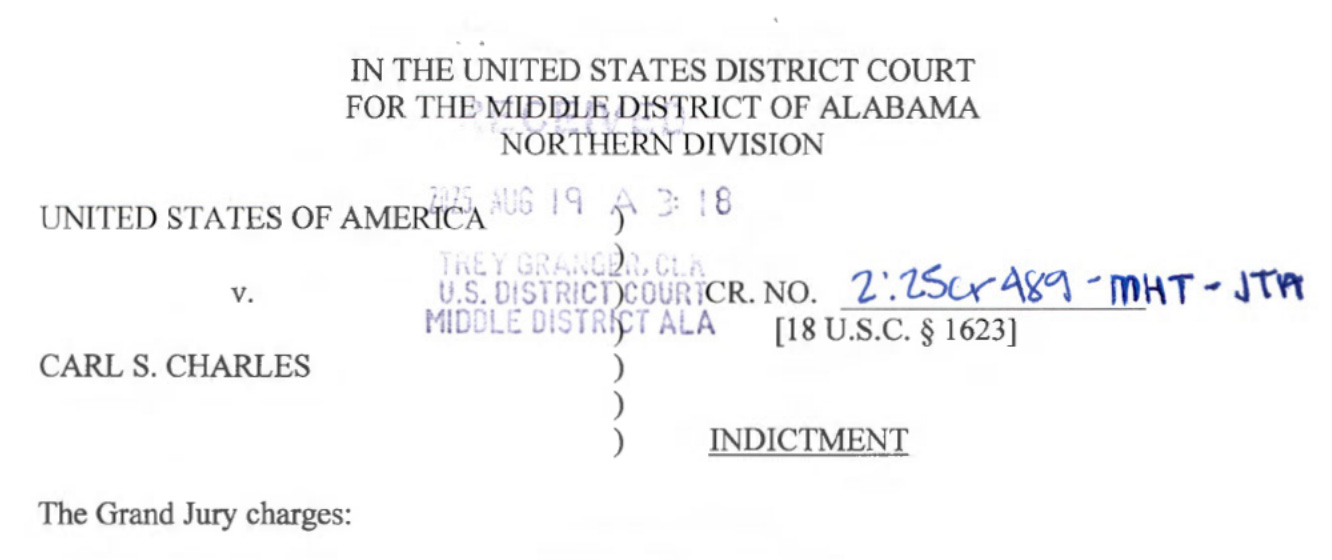

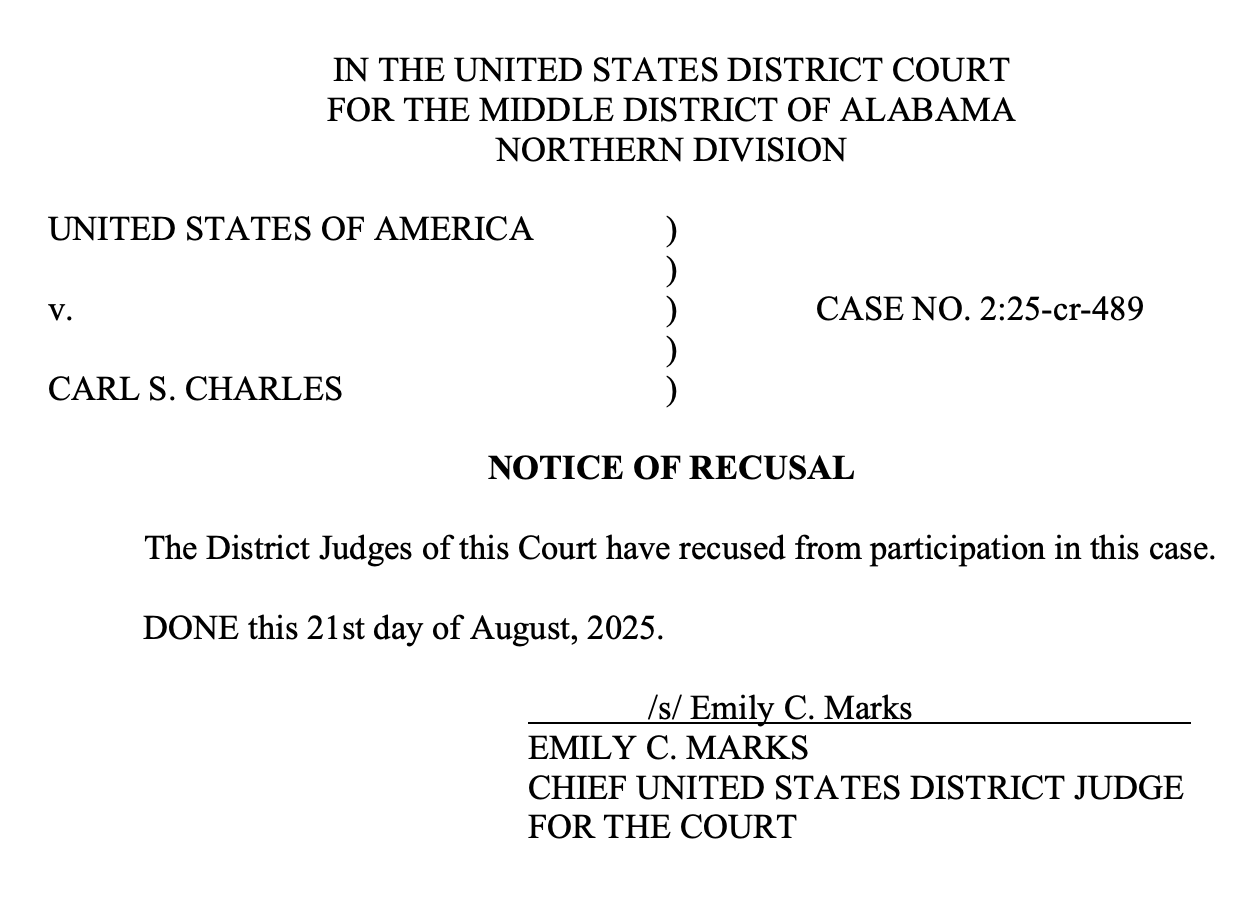
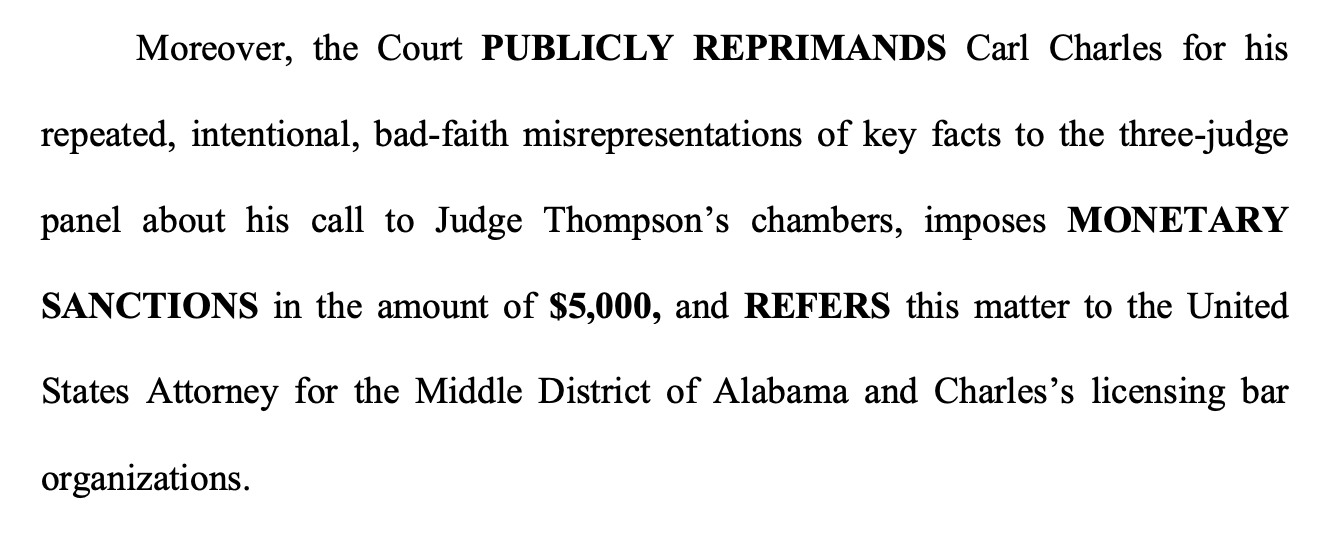
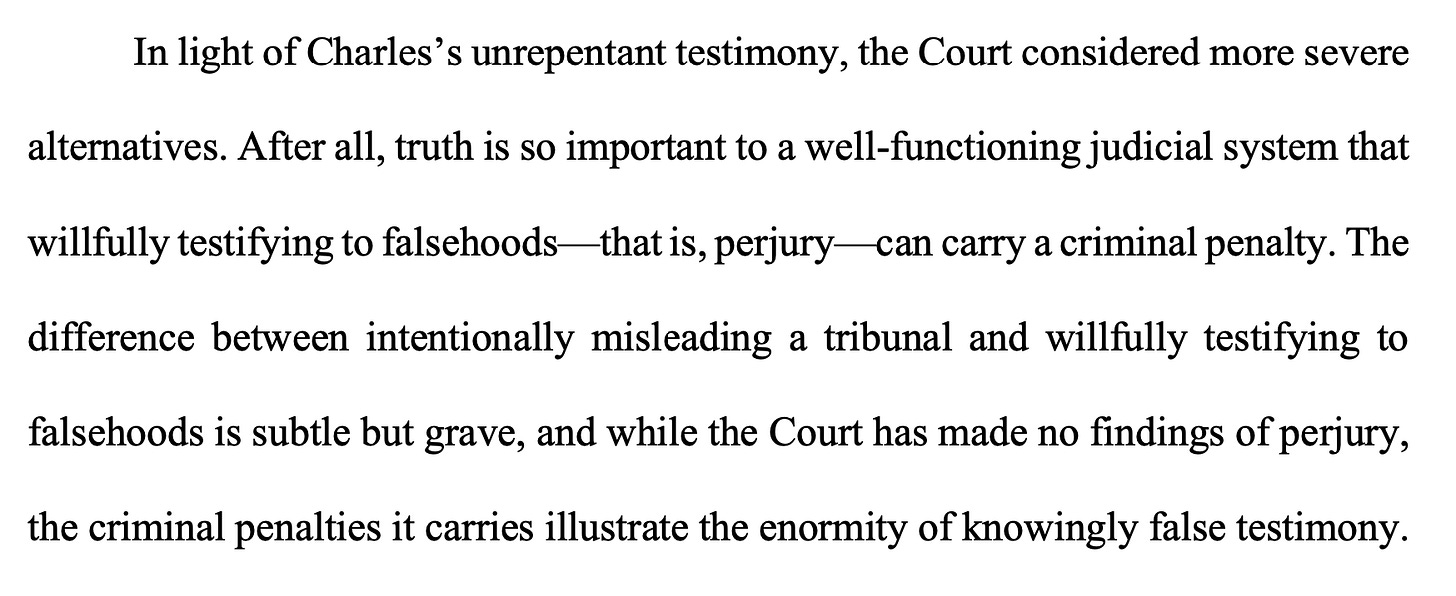
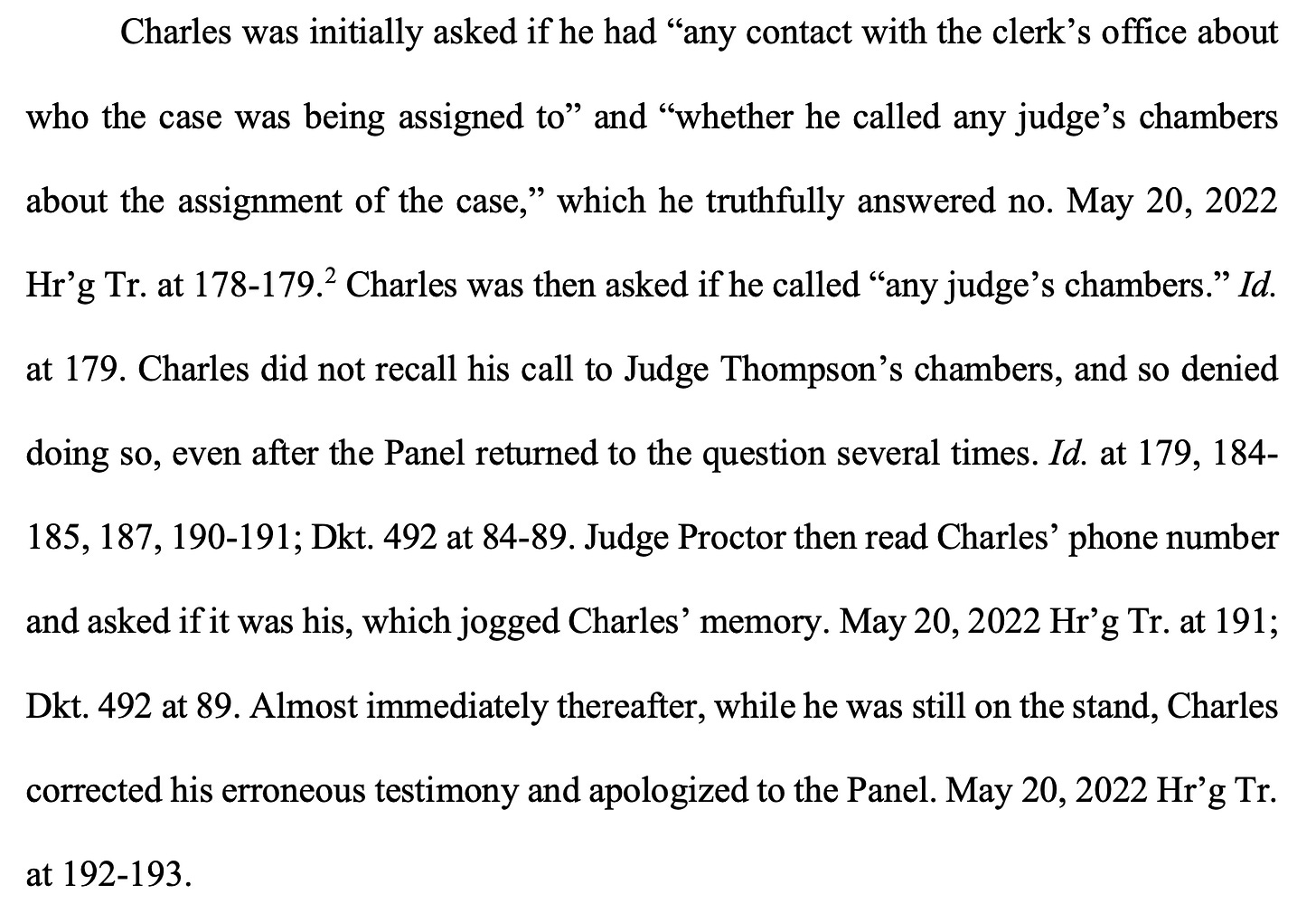
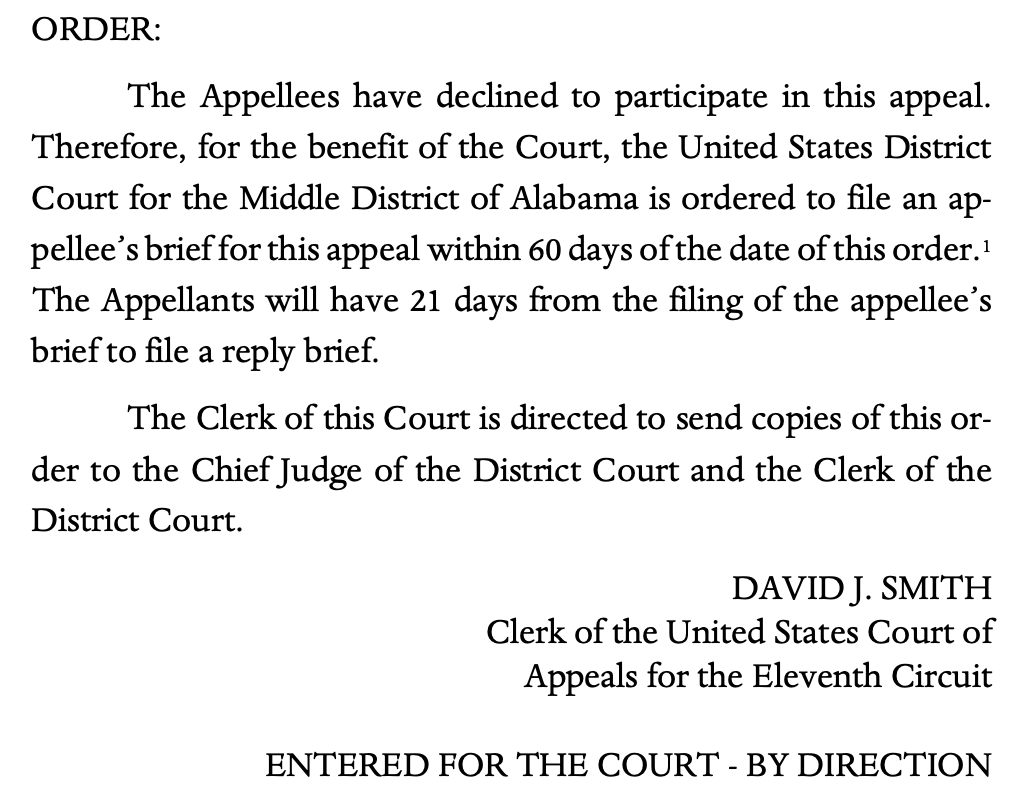
Really outstanding work Chris. Don't know how you manage to cover this while documenting all the Big Bad Law collapsing on top of us, but this story needs attention. Sanctions AND a felony charge for a momentary memory lapse? Reads like Gender Identity Jim Crow justice.
Sure sounds like they tried to punish everyone who defended trans rights & could barely get a couple attacks to land.
I'm sure the court will do something legitimate & led by sound legal principles, not malice. When has our justice system behaved in a way that history regards as shameful, especially towards minorities?